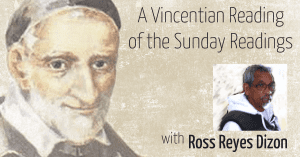 Jesus is the only blessing we need. He becomes our blessing, our consecration, by doing God’s will to the end.
Jesus is the only blessing we need. He becomes our blessing, our consecration, by doing God’s will to the end.
Elizabeth blesses Mary. For this, she does not depend on either Zechariah’s priesthood or his maleness. He hardly figures in the scene dominated by two women who are guided by the Holy Spirit.
It is by the Spirit’s inspiration that Elizabeth indicates that Mary’s blessing and Jesus’ blessing are inextricably linked. Elizabeth exclaims, “Blessed are you among women, and blessed is the fruit of your womb!”
Blessed is the mother of the Lord because she carries in her womb the joy of all nations. Blessed is she who believes that what the Lord has spoken to her will be fulfilled.
By such faith, the Word became human flesh, something more astonishing than moving mountains. Believing so, Mary fulfills perfectly the Father’s will. Therefore, “it means more for her, an altogether greater blessing, to have been Christ’s disciple than to have been Christ’s mother.” She is likened to her son, who came to do God’s will.
Having her faith, we are assured of the happiness that comes from intimacy with Jesus through hearing and doing God’s Word. The Word teaches us what true happiness consists in: “Blessed are you who are poor…; Blessed are you who are now hungry…; Blessed are you who are now weeping…; Blessed are you when people hate you…; Rejoice and leap for joy….”
We leap for joy in the presence of Jesus, the embodiment of these teachings and of the blessing that lies in humble service and in total and unconditional commitment till the end. Mary surely displays this service and commitment. She goes in haste to visit Elizabeth; she shares in her joy and shares her joy with her.
We rejoice that the Word is near us. Pondering the Word, we shall understand that in the community of the baptized, “there is…no longer male and female,” and that Jesus has made us to be a kingdom and priests. Doing the Word, we become creative as St. Vincent de Paul; he knew how to overcome juridical limitations, for example, to make women his co-workers (SV.FR XIII:810).
The Word urges us besides to devote ourselves to the Eucharist. This commits us to the poor and the new commandment, obliging us not to let those with nothing to go hungry, and to treat one another according to the example given by Jesus. True to our commitment, we will be given on earth a pledge of the future blessing in heaven.
Lord Jesus, be the blessing for all peoples (Ps 72, 17).
December 20, 2015
Fourth Sunday of Advent (C)
Mic 5, 1-4a; Heb 10, 5-10; Lk 1, 39-45







0 Comments